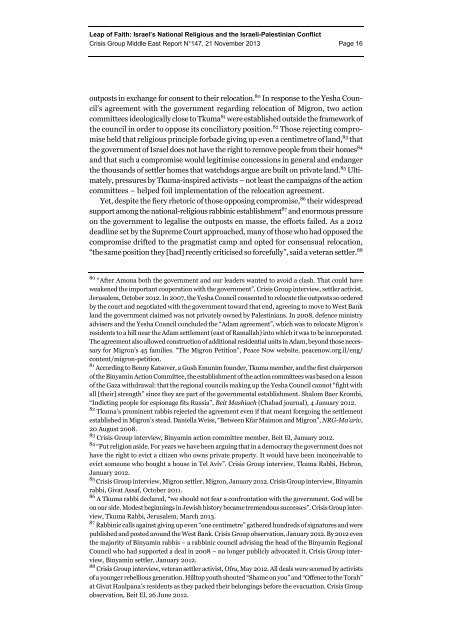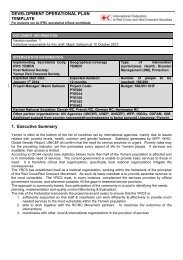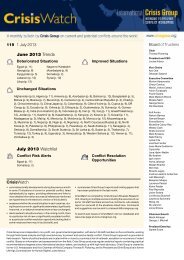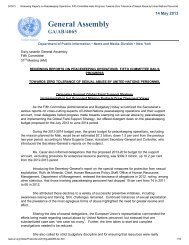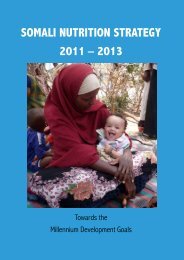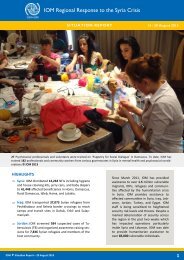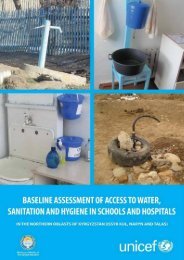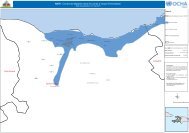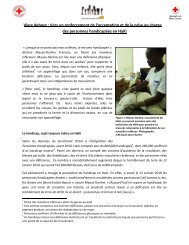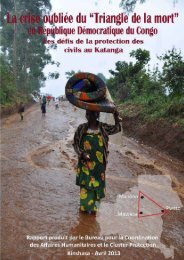Leap of Faith: Israel's National Religious and the Israeli ... - ReliefWeb
Leap of Faith: Israel's National Religious and the Israeli ... - ReliefWeb
Leap of Faith: Israel's National Religious and the Israeli ... - ReliefWeb
Create successful ePaper yourself
Turn your PDF publications into a flip-book with our unique Google optimized e-Paper software.
<strong>Leap</strong> <strong>of</strong> <strong>Faith</strong>: Israel’s <strong>National</strong> <strong>Religious</strong> <strong>and</strong> <strong>the</strong> <strong>Israeli</strong>-Palestinian Conflict<br />
Crisis Group Middle East Report N°147, 21 November 2013 Page 16<br />
outposts in exchange for consent to <strong>the</strong>ir relocation. 80 In response to <strong>the</strong> Yesha Council’s<br />
agreement with <strong>the</strong> government regarding relocation <strong>of</strong> Migron, two action<br />
committees ideologically close to Tkuma 81 were established outside <strong>the</strong> framework <strong>of</strong><br />
<strong>the</strong> council in order to oppose its conciliatory position. 82 Those rejecting compromise<br />
held that religious principle forbade giving up even a centimetre <strong>of</strong> l<strong>and</strong>, 83 that<br />
<strong>the</strong> government <strong>of</strong> Israel does not have <strong>the</strong> right to remove people from <strong>the</strong>ir homes 84<br />
<strong>and</strong> that such a compromise would legitimise concessions in general <strong>and</strong> endanger<br />
<strong>the</strong> thous<strong>and</strong>s <strong>of</strong> settler homes that watchdogs argue are built on private l<strong>and</strong>. 85 Ultimately,<br />
pressures by Tkuma-inspired activists – not least <strong>the</strong> campaigns <strong>of</strong> <strong>the</strong> action<br />
committees – helped foil implementation <strong>of</strong> <strong>the</strong> relocation agreement.<br />
Yet, despite <strong>the</strong> fiery rhetoric <strong>of</strong> those opposing compromise, 86 <strong>the</strong>ir widespread<br />
support among <strong>the</strong> national-religious rabbinic establishment 87 <strong>and</strong> enormous pressure<br />
on <strong>the</strong> government to legalise <strong>the</strong> outposts en masse, <strong>the</strong> efforts failed. As a 2012<br />
deadline set by <strong>the</strong> Supreme Court approached, many <strong>of</strong> those who had opposed <strong>the</strong><br />
compromise drifted to <strong>the</strong> pragmatist camp <strong>and</strong> opted for consensual relocation,<br />
“<strong>the</strong> same position <strong>the</strong>y [had] recently criticised so forcefully”, said a veteran settler. 88<br />
80 “After Amona both <strong>the</strong> government <strong>and</strong> our leaders wanted to avoid a clash. That could have<br />
weakened <strong>the</strong> important cooperation with <strong>the</strong> government”. Crisis Group interview, settler activist,<br />
Jerusalem, October 2012. In 2007, <strong>the</strong> Yesha Council consented to relocate <strong>the</strong> outposts so ordered<br />
by <strong>the</strong> court <strong>and</strong> negotiated with <strong>the</strong> government toward that end, agreeing to move to West Bank<br />
l<strong>and</strong> <strong>the</strong> government claimed was not privately owned by Palestinians. In 2008, defence ministry<br />
advisers <strong>and</strong> <strong>the</strong> Yesha Council concluded <strong>the</strong> “Adam agreement”, which was to relocate Migron’s<br />
residents to a hill near <strong>the</strong> Adam settlement (east <strong>of</strong> Ramallah) into which it was to be incorporated.<br />
The agreement also allowed construction <strong>of</strong> additional residential units in Adam, beyond those necessary<br />
for Migron’s 45 families. “The Migron Petition”, Peace Now website, peacenow.org.il/eng/<br />
content/migron-petition.<br />
81 According to Benny Katsover, a Gush Emunim founder, Tkuma member, <strong>and</strong> <strong>the</strong> first chairperson<br />
<strong>of</strong> <strong>the</strong> Binyamin Action Committee, <strong>the</strong> establishment <strong>of</strong> <strong>the</strong> action committees was based on a lesson<br />
<strong>of</strong> <strong>the</strong> Gaza withdrawal: that <strong>the</strong> regional councils making up <strong>the</strong> Yesha Council cannot “fight with<br />
all [<strong>the</strong>ir] strength” since <strong>the</strong>y are part <strong>of</strong> <strong>the</strong> governmental establishment. Shalom Baer Krombi,<br />
“Indicting people for espionage fits Russia”, Beit Mashiach (Chabad journal), 4 January 2012.<br />
82 Tkuma’s prominent rabbis rejected <strong>the</strong> agreement even if that meant foregoing <strong>the</strong> settlement<br />
established in Migron’s stead. Daniella Weiss, “Between Kfar Maimon <strong>and</strong> Migron”, NRG-Ma’ariv,<br />
20 August 2008.<br />
83 Crisis Group interview, Binyamin action committee member, Beit El, January 2012.<br />
84 “Put religion aside. For years we have been arguing that in a democracy <strong>the</strong> government does not<br />
have <strong>the</strong> right to evict a citizen who owns private property. It would have been inconceivable to<br />
evict someone who bought a house in Tel Aviv”. Crisis Group interview, Tkuma Rabbi, Hebron,<br />
January 2012.<br />
85 Crisis Group interview, Migron settler, Migron, January 2012. Crisis Group interview, Binyamin<br />
rabbi, Givat Assaf, October 2011.<br />
86 A Tkuma rabbi declared, “we should not fear a confrontation with <strong>the</strong> government. God will be<br />
on our side. Modest beginnings in Jewish history became tremendous successes”. Crisis Group interview,<br />
Tkuma Rabbi, Jerusalem, March 2013.<br />
87 Rabbinic calls against giving up even “one centimetre” ga<strong>the</strong>red hundreds <strong>of</strong> signatures <strong>and</strong> were<br />
published <strong>and</strong> posted around <strong>the</strong> West Bank. Crisis Group observation, January 2012. By 2012 even<br />
<strong>the</strong> majority <strong>of</strong> Binyamin rabbis – a rabbinic council advising <strong>the</strong> head <strong>of</strong> <strong>the</strong> Binyamin Regional<br />
Council who had supported a deal in 2008 – no longer publicly advocated it. Crisis Group interview,<br />
Binyamin settler, January 2012.<br />
88 Crisis Group interview, veteran settler activist, Ofra, May 2012. All deals were scorned by activists<br />
<strong>of</strong> a younger rebellious generation. Hilltop youth shouted “Shame on you” <strong>and</strong> “Offence to <strong>the</strong> Torah”<br />
at Givat Haulpana’s residents as <strong>the</strong>y packed <strong>the</strong>ir belongings before <strong>the</strong> evacuation. Crisis Group<br />
observation, Beit El, 26 June 2012.


